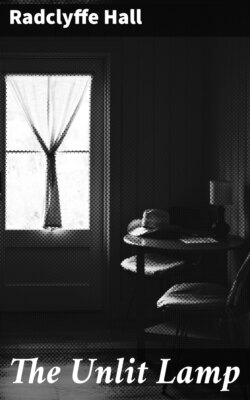Читать книгу The Unlit Lamp - Radclyffe Hall - Страница 14
На сайте Литреса книга снята с продажи.
2
ОглавлениеTable of Contents
The admiral's house was unique. He had built it after his wife's death; it had been a hobby and a distraction. Glory Point lay back from the road that led up to Cone Head, out beyond the town. To the casual observer the house said little. From the front it looked much as other houses, a little stronger, a little whiter perhaps, but on the whole not at all distinctive except for its round windows; and as only the upper windows could be seen from the road they might easily have been mistaken for an imitation of the Georgian period. It was not until the house was skirted to the left and the shrubbery passed that the character of Glory Point became apparent.
A narrow path with tall bushes on either side wound zigzag for a little distance. With every step the sound of the sea came nearer and nearer, until, at an abrupt angle, the path ceased, and shot you out on to a cobbled court-yard, and the wide Atlantic lay before you. The path had been contrived to appear longer than it was in reality, the twists and turns assisting the illusion; the last thing you expected to find at the end was what you found; it was very ingenious.
To the left and in front this court-yard appeared to end in space, and between you and the void stood apparently nothing but some white painted posts and chains. But even as you wondered what really lay below, a sharp spray would come hurtling over the chains and land with a splash almost at your feet, trickling in and out of the cobbles. Then you realized that the court-yard was built on a rock that ran sheer down to the sea.
At the side of this court-yard stood a fully rigged flagstaff with an old figure-head nailed to its base. The figure-head gazed out across the Atlantic, it looked wistful and rather lonely; there was something pathetic about the thing. It had a grotesque kind of dignity in spite of its faded and weather-stained paint. The ample female bosoms bulged beneath the stiff drapery, the painted eyes seemed to be straining to see some distant object; where the figure ended below the waist was a roughly carved scroll showing traces of gilt, on which could be deciphered the word 'Glory'.
From this side the house looked bigger, and one saw that all the windows were round and that a veranda ran the length of the ground floor. This veranda was the admiral's particular pride, it was boarded with narrow planks scrubbed white and caulked like the deck of a ship; the admiral called it his 'quarter-deck', and here, in fine weather or foul, he would pace up and down, his hands in his pockets, his cigar set firmly between his teeth, his rakish white beard pointing out in front.
Inside the house the walls of the passages were boarded and enamelled white, the rooms white panelled, and the steep narrow stairs covered with corrugated rubber, bound with brass treads. Instead of banisters a piece of pipe-clayed rope ran through brass stanchions on either side; and over the whole place there brooded a spirit of the most intense cleanliness. Never off a man-of-war did brass shine and twinkle like the brass at Glory Point; never was white paint as white and glossy, never was there such a fascinating smell of paint and tar and brass polish. It was an astonishing house; you expected it to roll and could hardly believe your good fortune when it kept still. Everyone in Seabourne made fun of Glory Point; the admiral knew this but cared not at all, it suited him and that was enough. If they thought him odd, he thought most of them incredibly foolish. Glory Point was his darling and his pride; he and his mice lived there in perfect contentment. The brass shone, the decks were as the driven snow, the white walls smelt of fresh paint, and away beyond the posts and chains of the cobbled court-yard stretched the Atlantic, as big and deep and wholesome as the admiral's kind heart.
